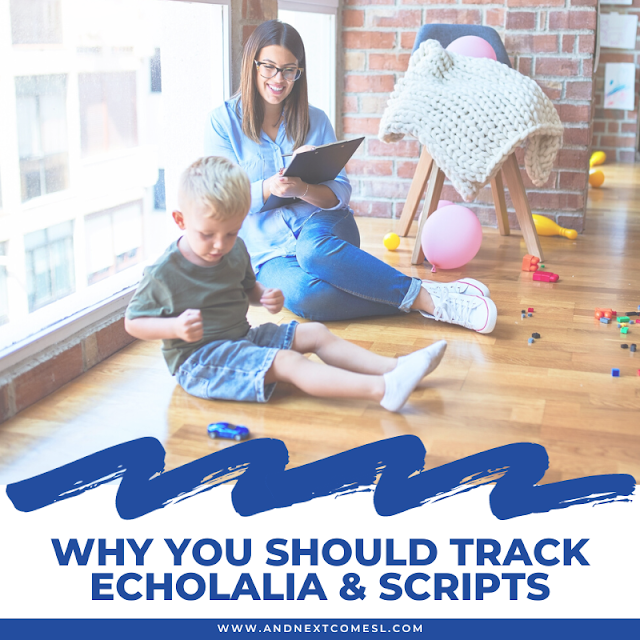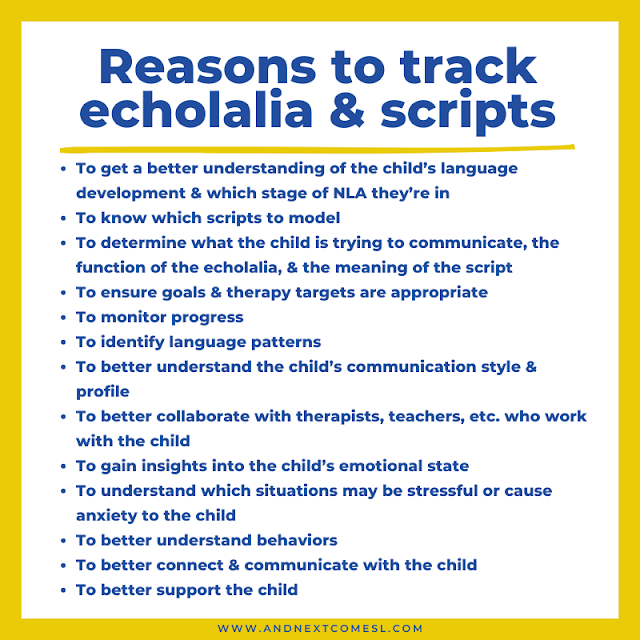Echolalia is meaningful communication. Full stop.
Historically, however, it wasn't always viewed this way. And, sadly, many still think that echolalia is meaningless.
Yet, for a lot of kids, like our gestalt language processors and hyperlexic learners, their language simply develops differently and echolalia is a big part of how they communicate.
The problem is that it's not always easy to determine what these kids might be trying to communicate with their echolalia.
That's why you should track echolalia and the scripts that a child uses. It gives you better insight into the child's language development and the echolalic phrases themselves. So let's take a closer look at some other reasons why tracking echolalia is so important.
Reasons Why You Should Track Echolalia & Scripts
As you'll see shortly, there are a wide range of reasons why you might find it helpful to track a child's echolalic speech and the scripts that they use on a daily basis. Sure it might seem like a lot of work at first, but doing so will provide you with plenty of useful information that will make it 100% worth it.
Remember, echolalia isn't meaningless. It communicates. It just requires some detective work. And tracking it can help make that detective work go a little bit easier.
So here are some reasons you should consider tracking a child's echolalic phrases and scripted language:
- To get a better understanding of the child's language development and which stage of Natural Language Acquisition (NLA) they're in
- To know which scripts to model (i.e., you want to model something that makes sense for which stage they're in)
- To determine what the child is trying to communicate, the function of the echolalia, and the meaning of a script
- To ensure goals and therapy targets are appropriate (e.g., targeting WH- questions only when they get to stage 4+ of NLA)
- To monitor progress (i.e., checking that the scripts you are modeling are a good fit and/or that the child is moving to the next stage)
- To identify language patterns (e.g., the child says the same script every night before bed)
- To better understand the child's communication style and profile (take pronoun reversals for instance)
- To better collaborate with therapists, teachers, etc. who work with the child (i.e., you'll be able to provide them with more insight into what certain scripts might mean, what stage they might be in, etc.)
- To gain insights into the child's emotional state (remember, a lot of scripts stick because they are emotionally charged!)
- To understand which situations may be stressful or cause anxiety to the child (e.g., maybe you notice an increase in scripting when the child is feeling anxious)
- To better understand behaviors
- To better connect and communicate with the child
- To better support the child
You can see there are lots of positives to tracking echolalia. Essentially, it leads to better understanding and better support for the child. And who doesn't want that?
Need an Easy Way to Track Those Echolalic Phrases?
Now that you know why you might want to track your child's echolalic phrases, you need an easy way to do so. That's where these echolalia tracking sheets come in handy (there's even a digital spreadsheet version included if you'd prefer to go paperless).
Grab your copy of the echolalia tracking sheets
A Recap of Reasons to Track a Child's Echolalic Speech
As you can see, tracking a child's language samples can provide you with so much insight and context, from which stage of development they're in to how they're progressing or even what their emotional state is. It's far from meaningless information, no?
You can use the knowledge you gain from tracking the child's scripts to develop better goals and model appropriate scripts. Again, pretty useful information.
Seriously, there are so many wonderful reasons why you should track echolalia and scripted language. So now only one question remains...will you be giving it a try? If so, these tips for tracking echolalia might help.






